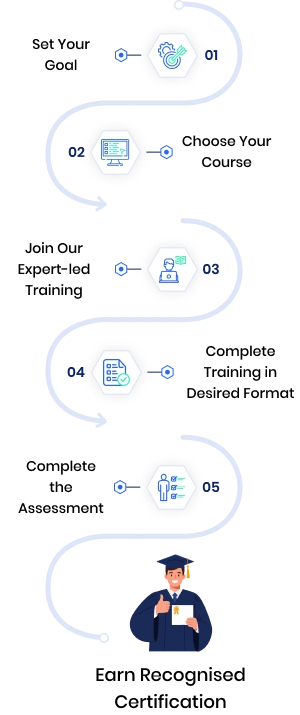Course Overview O v e r v i e w
- Course Overview
- Course Outline
- What’s Included
- What You’ll Learn
- Exam Details
BCS Foundation and Practitioner Certificate in Enterprise and Solution Architecture Overview
The BCS Foundation and Practitioner Certificate in Enterprise and Solution Architecture offers a comprehensive understanding of how organisations can design and implement effective business and IT systems. The course explores key architectural concepts, frameworks, and techniques that support strategic planning and solution delivery. It is ideal for professionals involved in architecture, business analysis, and IT strategy.
Formal training in enterprise and solution architecture provides a recognised framework for aligning technology with business goals. It equips learners with the skills to analyse requirements, design scalable solutions, and ensure consistency across systems and processes. Certification enhances professional credibility and supports career progression in architecture and related roles.
At Training Deals, our delivery approach focuses on practical learning and learner engagement. Experienced instructors combine solid theoretical insight with real-world application, enabling participants to confidently implement key principles. With flexible learning formats, competitive pricing, and a strong emphasis on quality, Training Deals is recognised as a reliable provider of BCS architecture training in the UK.

BCS Foundation and Practitioner Certificate in Enterprise and Solution Architecture Outline
Module 1: Fundamentals of Architecture
Meaning and Levels of Architecture
Various Subdomains of Enterprise Architecture and the Interactions Between Them
Purpose and Role of Standards and Frameworks in Architecture
Relevant Frameworks and Professional Standards Which Apply to Architecture
Meaning and Objectives of Governance, Risk Management and Compliance
Architect’s Contribution to a Business Case
Purpose and Methods of Performing Gap Analysis
Range of Drivers for Architecture
Purpose and Use of an Architecture Description
Module 2: Business Architecture
Meaning and Objectives of Business Architecture
Key Artefacts Commonly Used in Business Architecture
Key Activities Undertaken by a Business Architect
Structure and Behaviour of a Business System
Module 3: Applications Architecture
Meaning and Objectives of Applications Architecture
Key Artefacts Commonly Used in Applications Architecture
Key Activities Undertaken by an Applications Architect
Use and Behaviour of Applications in a Business
Purpose and Use of Cross-Reference Grids
Different Kinds of Application
Module 4: Data Architecture
Meaning and Objectives of Data Architecture
Key Artefacts Commonly Used in Data Architecture
Key Activities Undertaken by a Data Architect
Differences Between Data and Information and How They are Used
Data Structures Used by a Business and/or its Applications
Module 5: Infrastructure Architecture
Meaning and Objectives of Infrastructure Architecture
Key Artefacts Commonly Used in Infrastructure Architecture
Key Activities Undertaken by an Infrastructure Architect
Module 6: Software Architecture
Meaning and Objectives of Software Architecture
Key Artefacts Commonly Used in Software Architecture
Key Activities Undertaken by a Software Architect
System Modelling Techniques
Role of APIs in Software Architecture
Module 7: Security Architecture
Identify the Meaning and Objectives of Security Architecture
Describe the Key Artefacts Commonly Used in Security Architecture
Describe the Key Activities Undertaken by a Security Architect
Identify Legislation and Professional Standards Relevant to Security Architecture
Identify the Key Concepts in Data Architecture Security
Identify the Key Concepts in Applications Architecture Security
Key Concepts in Infrastructure Architecture Security
Module 8: Solution Architecture
Identify the Meaning and Objectives of Solution Architecture
Describe the Key Artefacts Commonly Used in Solution Architecture
Describe the Key Activities Undertaken by a Solution Architect
Describe Different Types of Solution Requirements
Explain the Purpose and Stages of the Solution Architecture Lifecycle
Stakeholder Categories in Solution Architecture
BCS Practitioner Certificate in Enterprise and Solution Architecture Training Course Syllabus
Module 1: Architecture Domains and Frameworks
Role of Architecture in an Organisation
Different Architecture Domains and the Relationships Between Them
Key Architecture Frameworks
How are Industry Standards Relevant to Architecture?
Module 2: Architecture and the Organisation
Role of Architecture to Other Business Areas
Discuss Use of the Business Change Lifecycle as an Input for Architecture
Business Needs and the Intended Solution
Module 3: Professionalism in Architecture
Compliance with Professional Standards
Types of Stakeholders
Explain Specific Stakeholder Needs
How to Influence Others?
Apply a Practical Customer Focus
Roles and Dynamics of a Successful Team
Social, Ethical and Economic Concerns to the Role of an Architect
Module 4: Corporate Governance
Corporate Governance and the Impact it has on the Role of an Architect
Key Architecture Governance Concepts, Roles, and Artefacts
Importance of Risk Management to the Role of an Architect
Module 5: Architectural Process, Tools, and Vision
Practical Application of the Solution Architecture Framework
Three Varieties of the Software Development Lifecycle (SDLC)
Design of a Target Solution Architecture
Use of Common Architecture Models
Use of Common Information Systems Modelling Techniques
Different Types of Business Requirements
Method of Preparing a Gap Analysis
Business Case for Presentation
Module 6: Quality Assurance
Use of a Range of Quality Assurance Tools or Techniques
Principle of Separation of Concerns (Soc)
Explain Change Management Tools and Processes
Opportunities for Continuous Improvement

What’s included in this BCS Foundation and Practitioner Certificate in Enterprise and Solution Architecture?
- Expert-led Training Sessions by Certified Instructors
- BCS Foundation and Practitioner Certificate in Enterprise and Solution Architecture Exam
- Digital Delegate Pack
What You’ll Learn in this Course
This course focuses on developing the skills needed to analyse, design, and optimise enterprise architecture within dynamic business settings. Through practical frameworks and real-world applications, it strengthens your capability to support and shape successful architectural strategies.
Learn the key concepts, domains, and terminology of enterprise architecture
Learn to apply architectural frameworks like TOGAF and Zachman
Learn to analyse business requirements and translate them into architectural solutions
Learn to evaluate architectural options and make informed design decisions
Learn to communicate architecture effectively to stakeholders across the organisation
Learn how to align architectural practices with strategic business goals

BCS Practitioner Certificate in Enterprise and Solution Architecture Exam Information
This course includes the BCS Practitioner Certificate in Enterprise and Solution Architecture exam and fully prepares you for it. The exam follows this format:
Duration: 1 hour
Type: Closed book
Questions: 40 multiple choice questions based on a case study
Pass Mark: 65% (26/40)

Our Upcoming Batches
Mon 13 Apr 2026 - Fri 17 Apr 2026
Duration: 5 Days
Mon 3 Aug 2026 - Fri 7 Aug 2026
Duration: 5 Days
Mon 7 Dec 2026 - Fri 11 Dec 2026
Duration: 5 Days
Mon 9 Feb 2026 - Fri 13 Feb 2026
Duration: 5 Days Buxton
Mon 11 May 2026 - Fri 15 May 2026
Duration: 5 Days Buxton
Mon 10 Aug 2026 - Fri 14 Aug 2026
Duration: 5 Days Buxton
Mon 9 Nov 2026 - Fri 13 Nov 2026
Duration: 5 Days Buxton
Request More Information

Corporate Training
Elevate your workforce with expert-led corporate training that enhances skills, boosts productivity, and aligns teams with your business goals.

Individuals Training
Unlock personal growth and sharpen professional skills with tailored training designed to build your confidence and career success.
Your Path to Professional Recognition
Our path is designed to guide you through each stage with clarity, support and practical learning, helping you achieve your goals with confidence.

Step Forward with Globally Recognised Certification
A recognised certification is more than a credential. It’s proof of your commitment to professional excellence, providing you with the credibility, confidence, and global reach to advance your career in exciting new directions.
Globally Certified Professionals Over Time
Career Growth
81%Certified professionals reported receiving a promotion after earning their certification.
Global Opportunities
89%Certified professionals experienced access to new career opportunities, including leadership roles and global positions.
Not able to find what you are looking for
Our experts will guide you to the right course from thousands worldwide: tailored to your goals.
Frequently Asked Questions
This course is ideal for IT professionals, business analysts, solution architects, and anyone involved in designing or managing enterprise architecture. It’s also suitable for those preparing for the BCS certification.
There are no prerequisites for the Foundation level. For the Practitioner level, you must hold either the BCS Intermediate Certificate, the BCS Foundation Certificate in Architecture Concepts and Domains, or TOGAF Level 2 certification. At least three years of IS/IT experience is also recommended.
The course covers architecture principles, frameworks (such as TOGAF and Zachman), business and IT alignment, stakeholder communication, and practical application of architectural methods.
Yes, the BCS Practitioner Certificate in Enterprise and Solution Architecture exam is included as part of the course package.
The exam is one hour long, closed-book, and consists of 40 multiple-choice questions based on a case study. The pass mark is 65% (26 out of 40).
What Our Customers Say About Us
 Matthew Sullivan
HR Business Partner
Matthew Sullivan
HR Business Partner
Our HR team registered for the Change Management Foundation & Practitioner Training Course, and it couldn’t have been more valuable. The team gained practical frameworks to guide employees smoothly through transitions with confidence.
 Olivia Barrett
Operations Manager
Olivia Barrett
Operations Manager
Our operations staff completed the Lean Six Sigma Green Belt Training Course, and it has been transformative. We can now identify inefficiencies quickly, and the tools we learned are already improving performance across the team.
 Benjamin Foster
Product Manager
Benjamin Foster
Product Manager
Our product team took part in the Agile Project Management Foundation & Practitioner (AgilePM®) Training Course, and the difference is remarkable. We’re now more adaptive, collaborative, and efficient in managing change.
 Lucy Harper
IT Support Lead
Lucy Harper
IT Support Lead
Our IT support unit attended the ITIL® 4 Foundation Training Course, and the results have been impressive. Processes are smoother, collaboration has improved, and the team finally speaks a common language of service management.
 Edward Clarke
Programme Manager
Edward Clarke
Programme Manager
We joined the PMP® Certification Training Course as a leadership group, and it was outstanding. The trainer made every concept practical, and the exam preparation resources helped the whole team feel ready to tackle complex projects.
 Amelia Rhodes
Project Officer
Amelia Rhodes
Project Officer
Our project office completed the PRINCE2® Foundation & Practitioner Training Course, and it has brought real clarity to how we manage projects. The trainer’s examples were excellent, and the team now follows a structured approach with confidence.

























